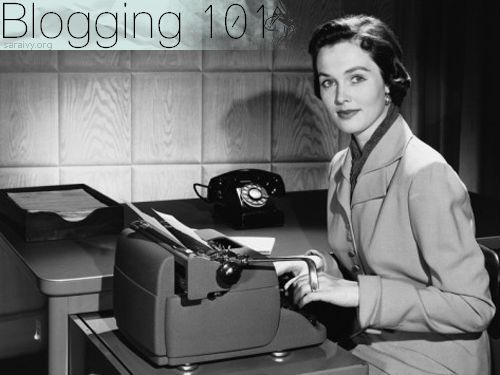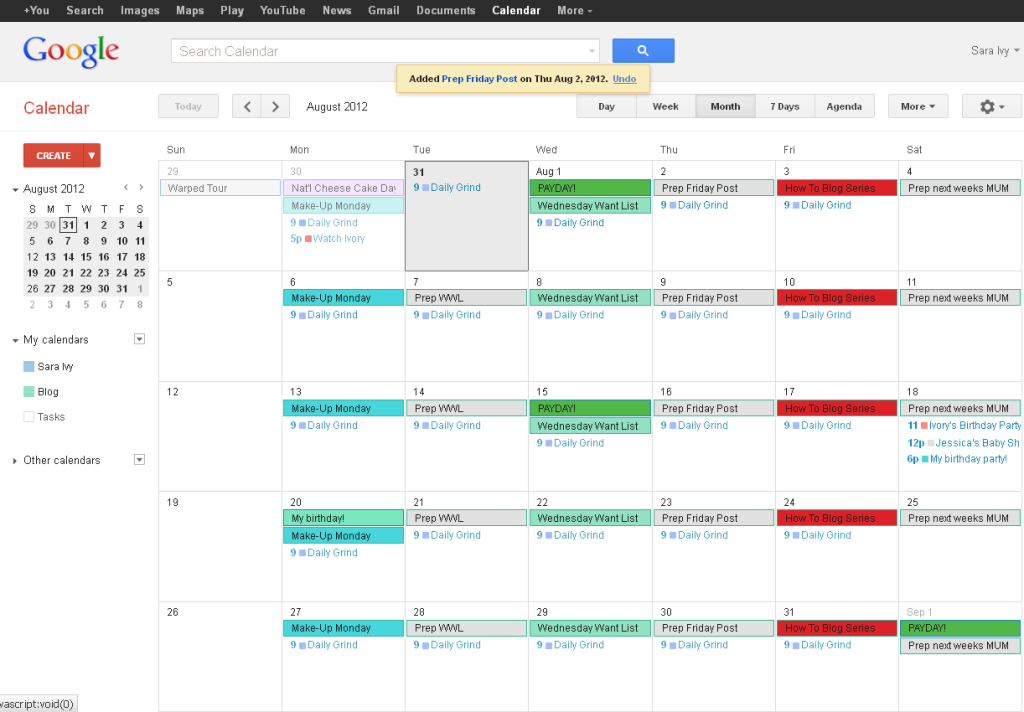So you have your blog with your cute layout that was designed just for you and you have a purpose and now you are going to start posting your content that is directly related to your purpose right? So how do you begin? If it is your very first post try doing an introduction. Make a "Welcome to My Blog" post. It's generic but it will help you learn formatting.
Here are some tips for you:
White Space:
HAVE SOME! Try to keep your posts between 300-600 words. If your post is going to be extremely long, break it up with white space and pictures. Look at your favorite blogs. What do they look like? Long streams of text or paragraphs separated by lovely white spaces?
HAVE SOME! Try to keep your posts between 300-600 words. If your post is going to be extremely long, break it up with white space and pictures. Look at your favorite blogs. What do they look like? Long streams of text or paragraphs separated by lovely white spaces?
Links:
Always try to incorporate a few links into your post. Links out are fine but try to link to other content you have posted. Keep generating traffic within your site to keep people engaged longer.
Tags:
You are the graffiti artist of your own website so tag everything. SEO or Search Engine Optimization is based off tagging and Google (you know the biggest search engine ever?) finds your page and lists you as an authority on that topic ONLY if you tag your posts. So do it. I'm going to run down a few of the Do's and Don'ts of tagging.
- DO tag every single post with at least THREE tags.
- DON'T tag everything "Britney Spears" just because you like her. Unless you are a Britney fan site, have a photo of Britney Spears on that page or mention her somewhere in the post there is no need for it. Google isn't stupid and haven't you ever been annoyed by searching for something and something completely irrelevant popped up? Yeah, don't be that guy/girl/jackass.
- DO keep track of your site(or Google) analytics and see which tags are driving the most traffic to your website. Then continue to post content so you can reuse that tag!
- DON'T keep using that tag on posts that it doesn't pertain to. Again, Google probably helped you pass a bajillion tests so you know it isn't stupid. It will learn the difference and you will have thrown all your hard work away.
- DO create tags for your posts based on how you would search for them. For example, if you write a blog on make up what would you yourself type in Google to find it and get it to come up? I'm not saying type "website-name.org, make up" but for example if I want someone to find my latest Make Up Monday post, you better believe I tagged that post as 'Make Up Monday' and loved every minute of it.
- DO use tags as navigation! Tags are also an excellent way for people to find things within your website, so if they only come for your fashion posts they can click "Fashion" and every post tagged with fashion will come up. This helps them navigate away from the things they don't want to read about and keeps them coming back for the things they do want to read about.
- DON'T tag your post with generic tags like 'blog' or 'girl' because that's not specific. Be creative, it pays off
Social Media:
Everyone is in contact with some form of social media. If you want to keep in contact with people, have some type of authority on the internet and drive traffic to your website? Then you need social media and you need to know how to play up each network's strengths to your advantage. For example; tumblr is simple to use but only really generates traffic within its confines, it doesn't do a lot of out sourcing. If you are only getting 20 visitors a month from tumblr it's time to make a decision; either step it up on tumblr or let that sinking ship go down. However, if you are getting 100 unique visitors per day from twitter? Forget Tumblr, keep on top of Twitter and drive that traffic, keep up those interactions, ect.
Everyone is in contact with some form of social media. If you want to keep in contact with people, have some type of authority on the internet and drive traffic to your website? Then you need social media and you need to know how to play up each network's strengths to your advantage. For example; tumblr is simple to use but only really generates traffic within its confines, it doesn't do a lot of out sourcing. If you are only getting 20 visitors a month from tumblr it's time to make a decision; either step it up on tumblr or let that sinking ship go down. However, if you are getting 100 unique visitors per day from twitter? Forget Tumblr, keep on top of Twitter and drive that traffic, keep up those interactions, ect.
There are ways to cultivate each social media network and grow your presence on them. Perhaps I'll go into deeper detail about this on a later date, maybe in a separate series? I did do social media marketing for an internet company I worked for so it's not like I'm a beginner or anything but for right now I'll leave you with this cheat sheet and offer this piece of advice; KEEP UP.

Photos:
You are going to hear a lot of contradicting information when it comes to photos: yes have them, no don't have them, never center them, center them, keep them all one size, have them expand the whole width of your page, ect. Follow your gut. Preview your posts before publishing them and make sure that they look good. As long as you think they look good then that's really all that matters because it is your blog. You won't be able to please everyone and you will drive yourself mad hater insane trying to do so. My suggestion is to make sure you have CLEAR, bright photo's that look good with your layout (as in they don't extend out of your main frame into your side bar, no broken images and aren't too big or too small to be seen properly) and beyond that aim for just pleasing yourself.
You are going to hear a lot of contradicting information when it comes to photos: yes have them, no don't have them, never center them, center them, keep them all one size, have them expand the whole width of your page, ect. Follow your gut. Preview your posts before publishing them and make sure that they look good. As long as you think they look good then that's really all that matters because it is your blog. You won't be able to please everyone and you will drive yourself mad hater insane trying to do so. My suggestion is to make sure you have CLEAR, bright photo's that look good with your layout (as in they don't extend out of your main frame into your side bar, no broken images and aren't too big or too small to be seen properly) and beyond that aim for just pleasing yourself.
Finding Time To Blog:
Ok, so maybe you've done a few posts on this blog of yours and between work, school, social life, ect you are wondering where the heck do these people who churn out posts every couple of days keep up with the demands on their blog? Well that's solved in one word: SCHEDULING! I have pre-written and scheduled every single one of these posts about blogging way ahead of time. I usually use my weekends for writing up large pieces of content. For example my Make Up Monday posts are written a week ahead of time. My Wednesday Want List polyvore collages are usually done a few days in advance and then I write them up and schedule the post to be published on Wednesday the Tuesday before it comes out. That way I spend more time enjoying life than blogging about the life I wish I had if my blog didn't take up so much of my damn time! <- Sarcasm.
Ok, so maybe you've done a few posts on this blog of yours and between work, school, social life, ect you are wondering where the heck do these people who churn out posts every couple of days keep up with the demands on their blog? Well that's solved in one word: SCHEDULING! I have pre-written and scheduled every single one of these posts about blogging way ahead of time. I usually use my weekends for writing up large pieces of content. For example my Make Up Monday posts are written a week ahead of time. My Wednesday Want List polyvore collages are usually done a few days in advance and then I write them up and schedule the post to be published on Wednesday the Tuesday before it comes out. That way I spend more time enjoying life than blogging about the life I wish I had if my blog didn't take up so much of my damn time! <- Sarcasm.
Basically organization is key. I showed you my calendar for my blog but I didn't show you my calendar for me paired with my blog:
It looks like a lot but trust me, it is much better to schedule out reminders and schedule time for things. This isn't set in stone. I can always prep my Make Up Monday (MUM) post on Sundays if I'm too busy on Saturday and sometimes I have a whole week scheduled so I can live during that week and not once look at my blog!
More Advice:
My Girl Thursday has a very interesting article/vlog about making your blog pretty for nothing and basically have written a whole slew of blogs geared towards this exact topic. Expand your mind with their "blogging" label.
But basically it boils down to this image:
I promise you, as long as you follow the above mantra you will never be steered wrong as far as blogging goes.
Thank you so much for visiting my blog and allowing me to guide you a bit through the blogging process. I'm always available for questions beyond this and would love to go in-depth or expand on any of the topics I've covered if need be. Just drop me an e-mail, comment or contact me on any of my various social networks. Thanks again for reading!




Great advice. I think scheduling is by far the most helpful blogging tool. It saves so much time and stress.
ReplyDeleteNessa,
ReplyDeleteIt's definitely a stress relief for me. I basically do everything on the weekends or early morning before work. Saves me from thinking about it every day.